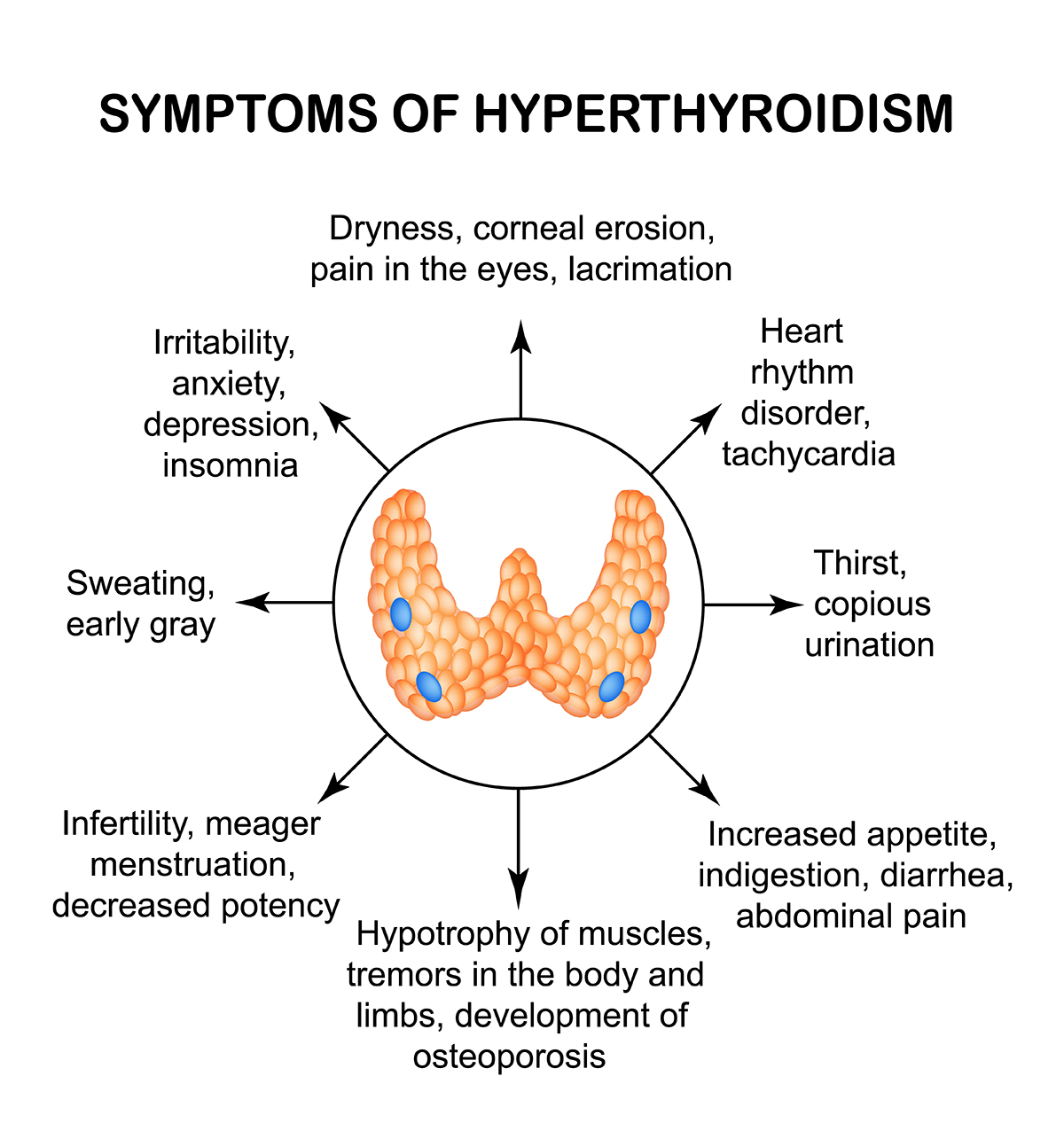Overactive thyroid glands show up in the form of numerous symptoms. As such having a hyperactive thyroid causes an increase in the metabolic rate, and changes in many other vital functions of the body. These changes manifest in the form of hyperthyroidism symptoms.
Effects of hyperthyroidism
Any disorder of the thyroid glands affects the cardiovascular system, nervous system, digestive system, the reproductive system, and adrenal glands.
In the case of hyperthyroidism:
- Metabolism of the body increases leading to increased appetite, and weight loss.
- It increases the heart rate, and leads to cardiovascular disease risks.
- It reduces the bone mineral density and increases the risk of fractures.
- It decreases muscle mass and leads to reduction in strength and grip.
- Causes changes in skin and leads to swelling in the fingertips and a condition called infiltrative dermopathy
- Leads to thinning of hair and hair loss
- Leads to psychological conditions like hyperactivity, anxiety, irritability
- In the case of elderly patients, it can cause dementia, or depression
- It affects the eye causing eye irritation, eyelid lag, and bulging eye in a condition called Graves’ ophthalmopathy
When it comes to the effects on the cardiovascular system, hyperthyroid disease causes increased heart rate, pulmonary artery hypertension, increased systolic blood pressure, and decrease in the diastolic blood pressure and oxygen consumption in the heart. These changes in the cardiovascular system due to hyperactive thyroid can lead to atrial fibrillation, heart failure, and Thyrotoxic cardiomyopathy.
Hyperthyroid disease is also known to affect the nervous system leading to cognitive impairment, confusion, increased risk of dementia, optic nerve conditions, retinopathy, and motor nerve conditions. It also leads to a condition called acute Thyrotoxic myopathy that leads to severe muscle weakness. In some cases, it causes spastic paraplegia.
When it comes to the effect of hyperthyroidism, since there are receptors of thyroid hormones in the bones, there is significant reduction in bone mineral density.
Apart from these, hyperactive thyroid is also linked to increased bowel movements, increased appetite, and weight loss.
Hyperthyroidism symptoms
Metabolic
- Increased appetite
- Weight loss
- Increased bowel movements
Cardiovascular
- Increased heart rate (tachycardia)
- Irregular pulse
- Shortness of breath
- Palpitations
- Increased systolic blood pressure
- Decreased diastolic pressure
Skin
- Thyroid dermopathy
- Swelling of fingertips, hands and feet
- Generalized hyperpigmentation on face and neck
- Plummer nails (a form of disfiguration of the nails)
- Vitiligo
Psychiatric
- Nervousness
- Anxiety
- Irritability
- Jitteriness
- Depression
- Rapid speech
- Psychosis
- Insomnia
Eye
- Increased tears
- Eyelids not completely closing while sleeping
- Sensitivity to light
- Sensitivity to dust, wind, and smoke
- Irritation of the eyes
- Double vision
- Blurred vision
- Reduced color perception
Other symptoms
- Tremors
- Heat intolerance
- Eyelid lag
- Excessive sweating
- Muscle aches
- Weakness in limbs
- Hair loss
- Fatigue












